By Thomas Ferguson, Director of Research, Professor Emeritus, University of Massachusetts, Boston; Paul Jorgensen, Assistant Professor of Political Science, University of Texas-Pan American, and Jie Chen, University Statistician, University of Massachusetts. Originally published at the Institute for New Economic Thinking website
Talk about “tribalism” in American politics is all the rage. But in politics the chiefs of the tribes do almost all the talking. And they raise money, on a colossal scale. So, take a look. Does their fundraising reflect a tide of small donations from masses of concerned Americans they claim to be speaking for?
Size of Contributions: Profiles of American Political Leaders, 2016 Cycle
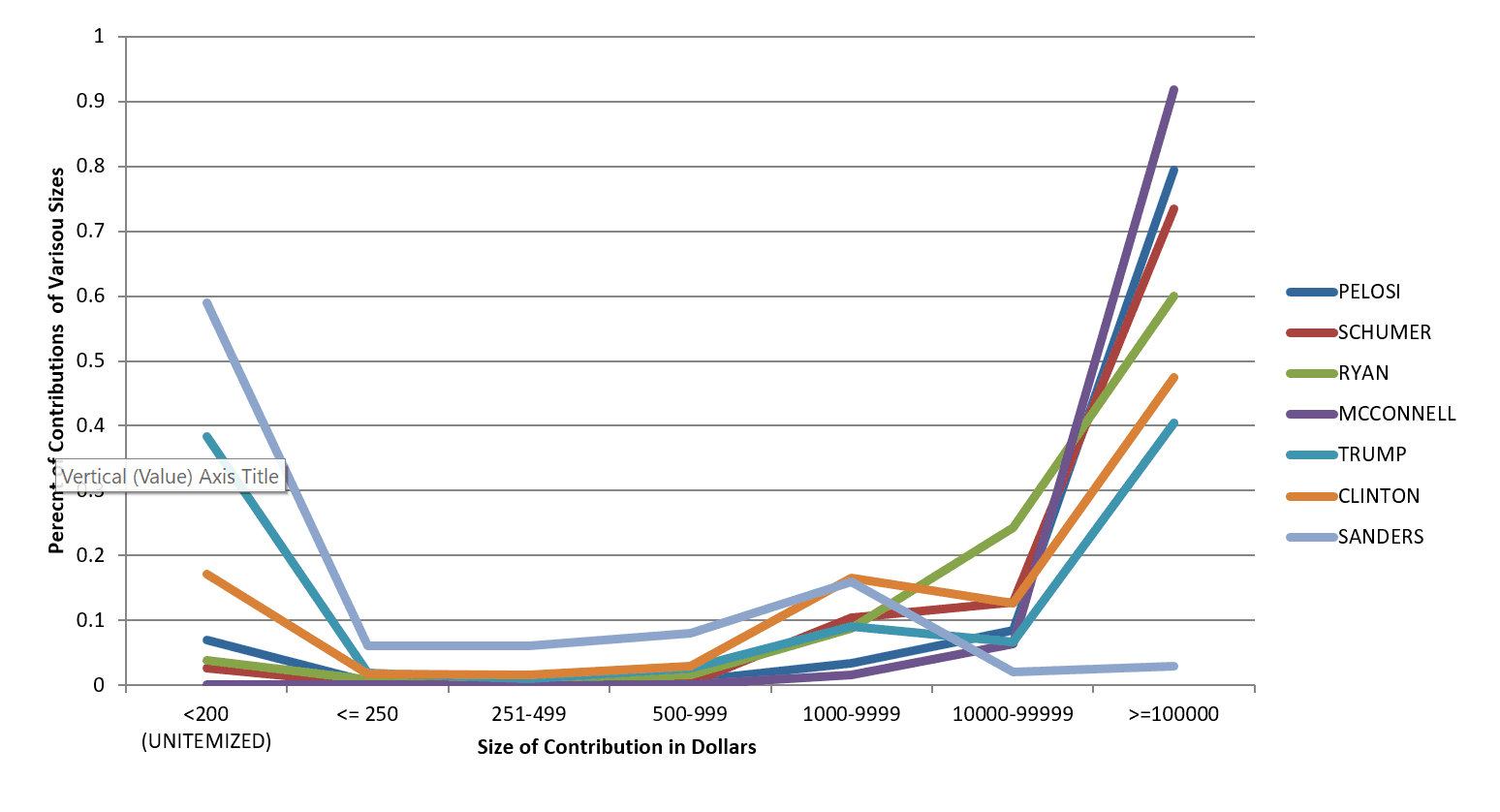
The Lesson:
1. Political leaders of both major parties depend heavily on large contributions — meaning over $10,000 or $100,000 — in our 2 year election cycles.
2. Mitch McConnell is uniquely reliant on them. In 2016 Clinton relied more on them than Trump, though both had high levels.
3. Bernie Sanders was the one exception. Almost 60% of his were below the $200 limit for itemization. He received essentially no large contributions. Trump also received substantial small contributions.
But perhaps through some miracle of democracy elections express the will of the people anyway?
So, take a look at some more pictures. Does their fundraising reflect a tide of small donations from masses of concerned Americans they are speaking for?
What Would the Sound of Money Talking Look Like?
How about a straight line?
The vote split in races closely tracks the money split in the 2016 Congressional elections:
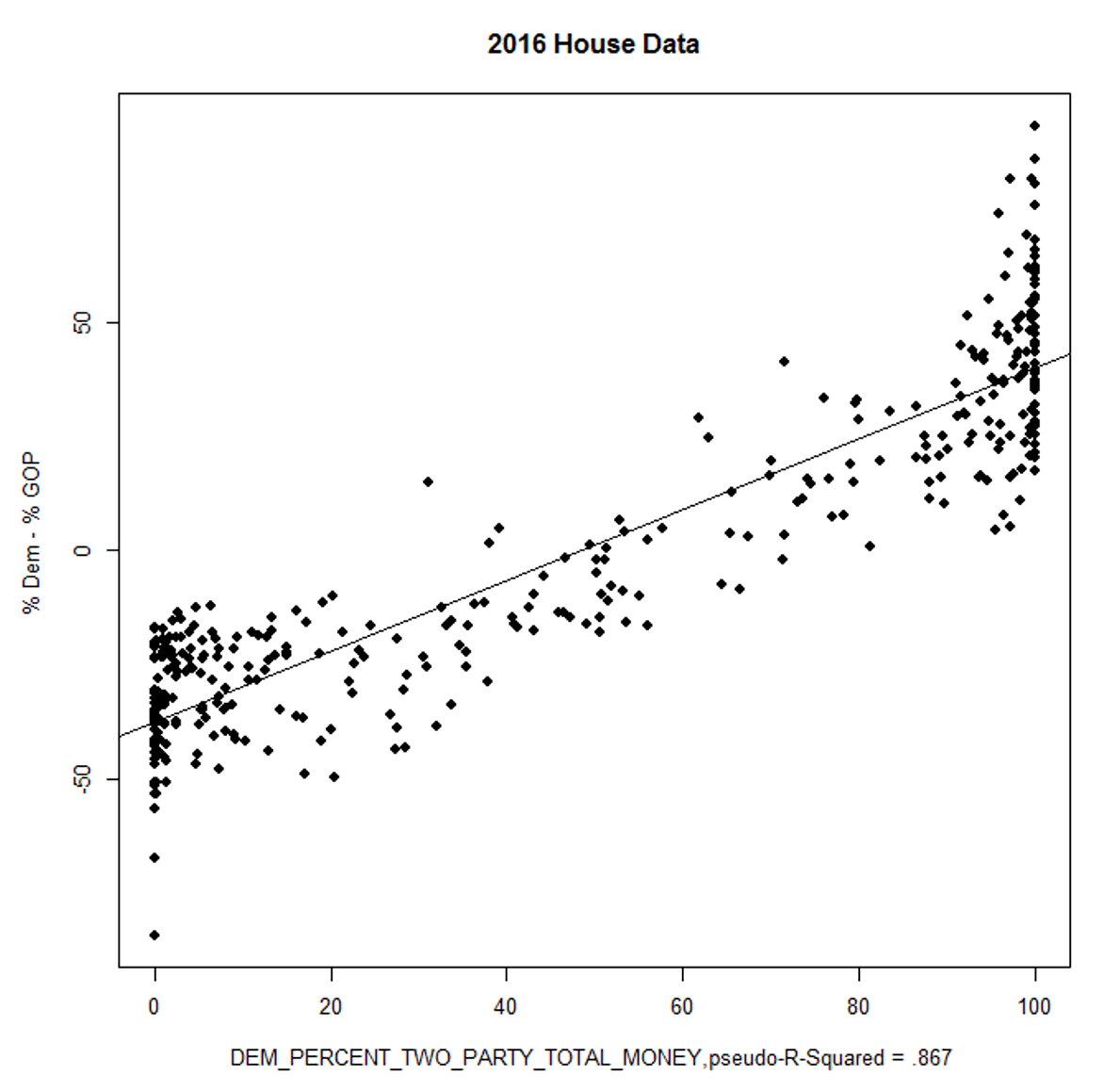
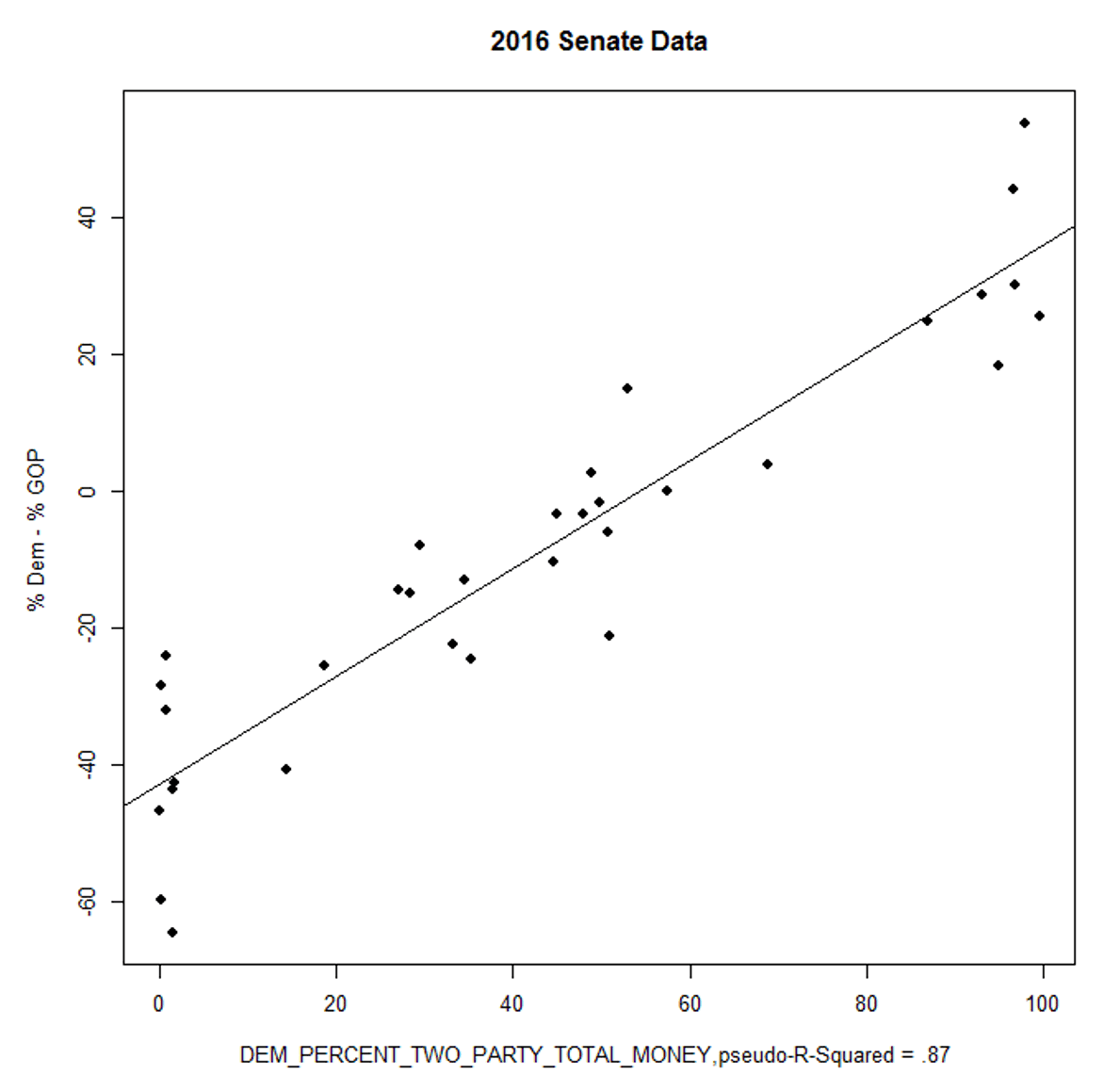
All American Elections for Which the Data Exist Show This Pattern
(See Ferguson, Jorgensen, Chen, 2016).
But it’s not a pathology peculiar to the US. French parliamentary and municipal elections show the same “linear model” pattern (Cage, 2018).
US House Elections, 1980-2012
Money spent closely tracks votes, yet again.
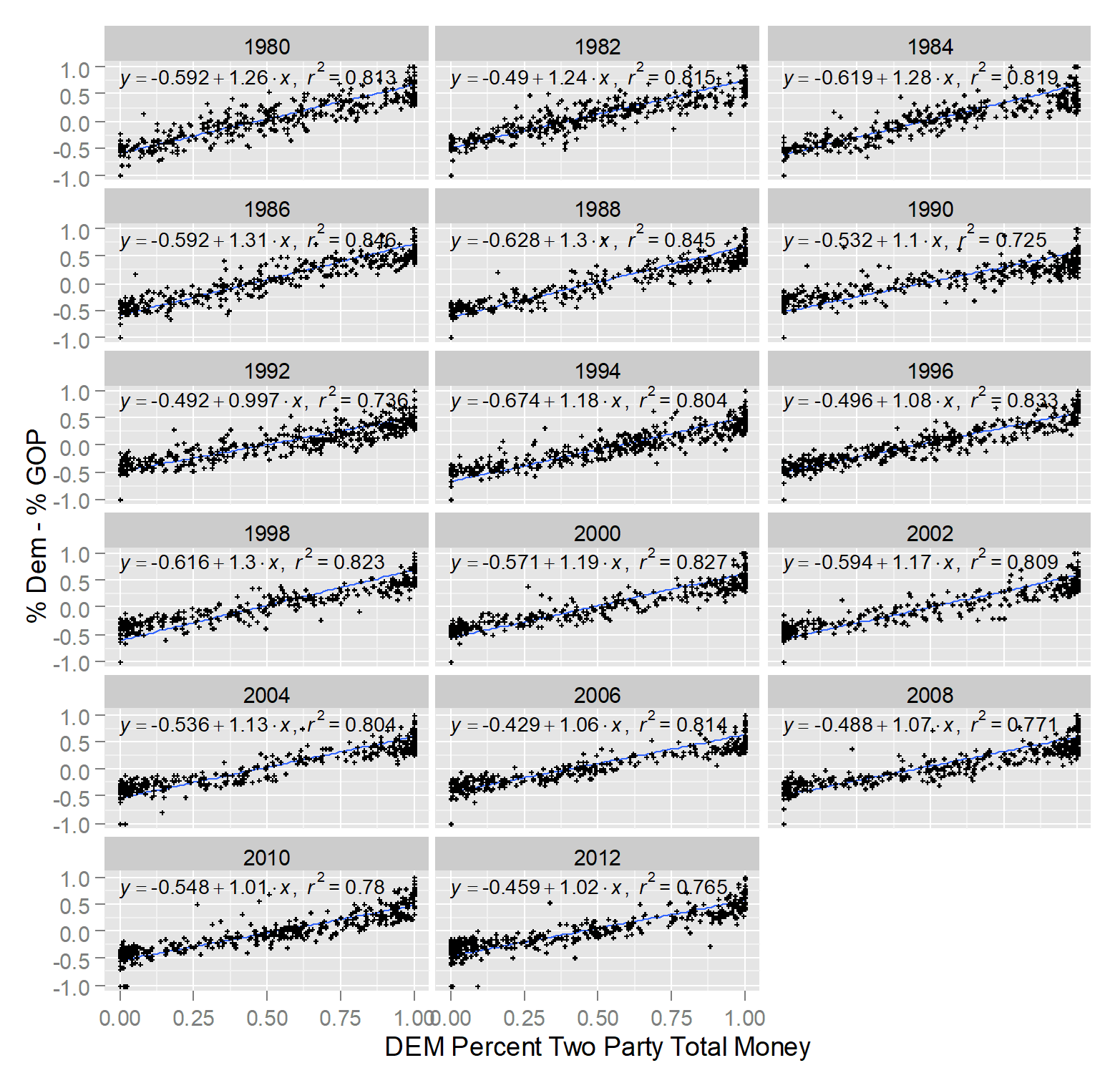
The same pattern shows in Senate Elections, 1980 to 2014
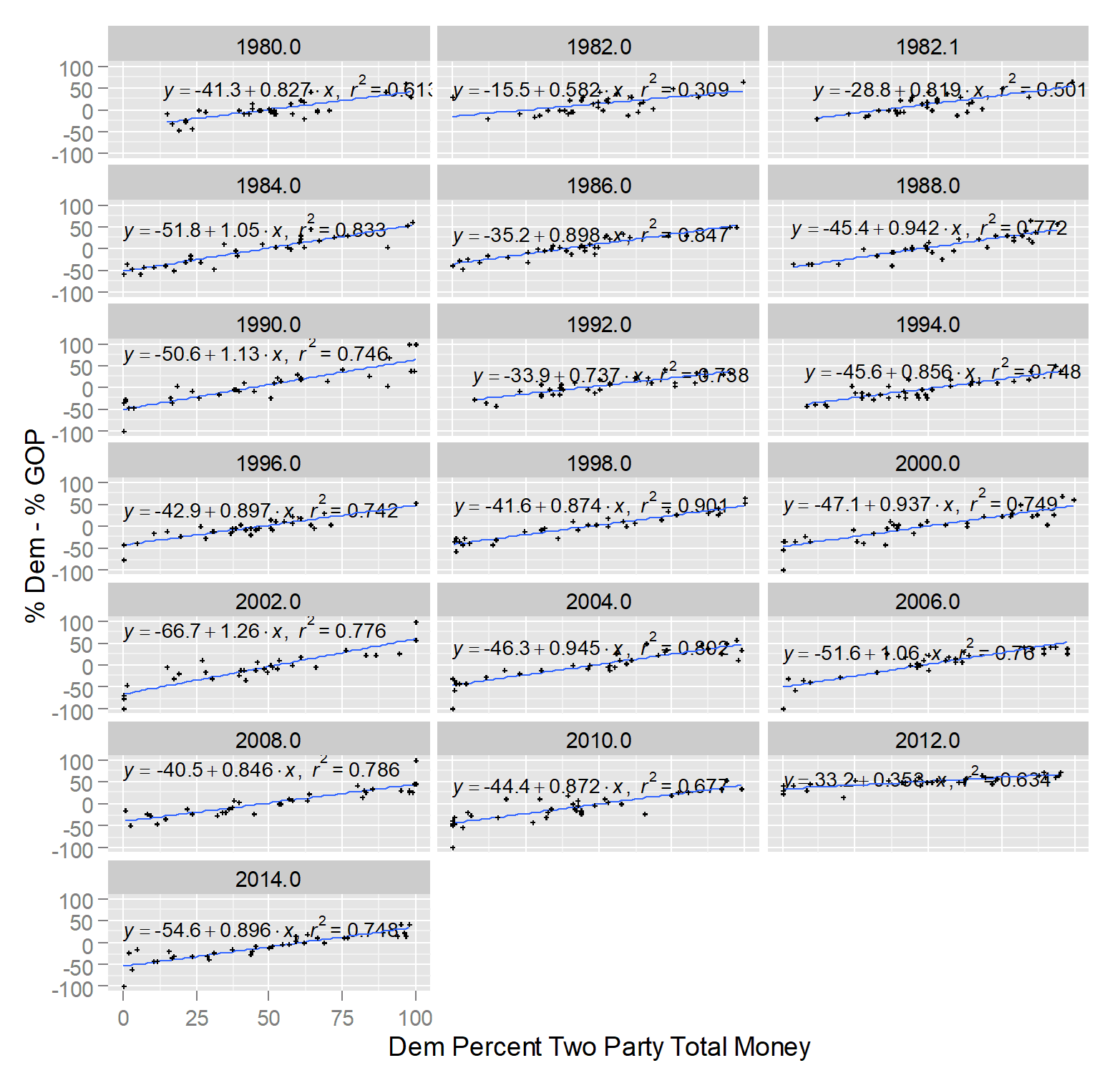
Saving the appearances?
Maybe the money follows votes?
Not in general: See Ferguson, Jorgensen, and Chen’s “How Money Drives US Congressional Elections,” INET Working Paper # 48, 2016
Many estimates of “donor concentration” — how much of total money comes from a few donors – exist. We find none convincing; they are nearly all too low, even when the numbers are shocking. They do poorly at aggregating money from people in the same firms.
Measuring Formal Campaign Money Is Very Difficult
1. Must combine Federal Election Commission totals + IRS, which oversees “527” monies + state and local
2. Names of individuals are unreliable; same with addresses, occupations, Sr., Jr., Ms., etc.
3. Many company names are opaque or disguised
4. Massive double counting, including “ersatz dark money” with PACs and 527s party transfers, etc.; disentangling flow of actual new money from real sources is the key problem
5. Critical role of the “investing unit” – that is putting people from the same companies together.
See Ferguson, Jorgensen, Chen, 2013, 2016, 2017; our estimates are routinely much higher than others’.
Our estimates do not include state and local races, unless they make it into federal sources.
Percent of Original Money from Top 400 Donors & Top .01% of Donors
| DONOR | PERCENT | AMOUNT |
|---|---|---|
| Top 400 Donors | % 29.86 | $2,446,370,446.62 |
| Top .01% | % 57.16 | $4,682,337,094.94 |
Percent of Original Money from Top 400 Donors & Top .01% of Donors, Not Including Labor
| DONOR | PERCENT | AMOUNT |
|---|---|---|
| Top 400 Donors | % 26 | $2,150,496,653.66 |
| Top .01% | % 54 | $4,386,463,301.98 |
The State of Countervailing Power in America, 2016
• ∫Sum the two types of Labor contributions — itemized and un-itemized $ totals — to arrive at total Labor $ in federal elections and compare to all other money.
• $564,592,573 — 7% of all money
Some leaders of the Blue Tribe are now proposing a “bold” reform:
Refuse all PAC money.
What difference would that make?
Our answer:
Very little.
Contributions from Pacs to Dem Senate campaigns add up to about 10% of all spending.
(Higher figures you see come from excluding “outside” money from Super Pacs and non-profits officially unconnected to the campaigns.)
Even assuming no substitution of additional personal contributions for the missing pac funds (a ridiculous notion), this doesn’t add up to much.
What would truly change the system?
First consider two sobering points:
1. The power of money is directly related to inequality.
2. There may be a point of no return. Consider the next graph.
This plots salaries of top federal regulators over time against incomes of those in financial markets. If you can walk out of your post to become far richer, it is idle to expect serious regulation.
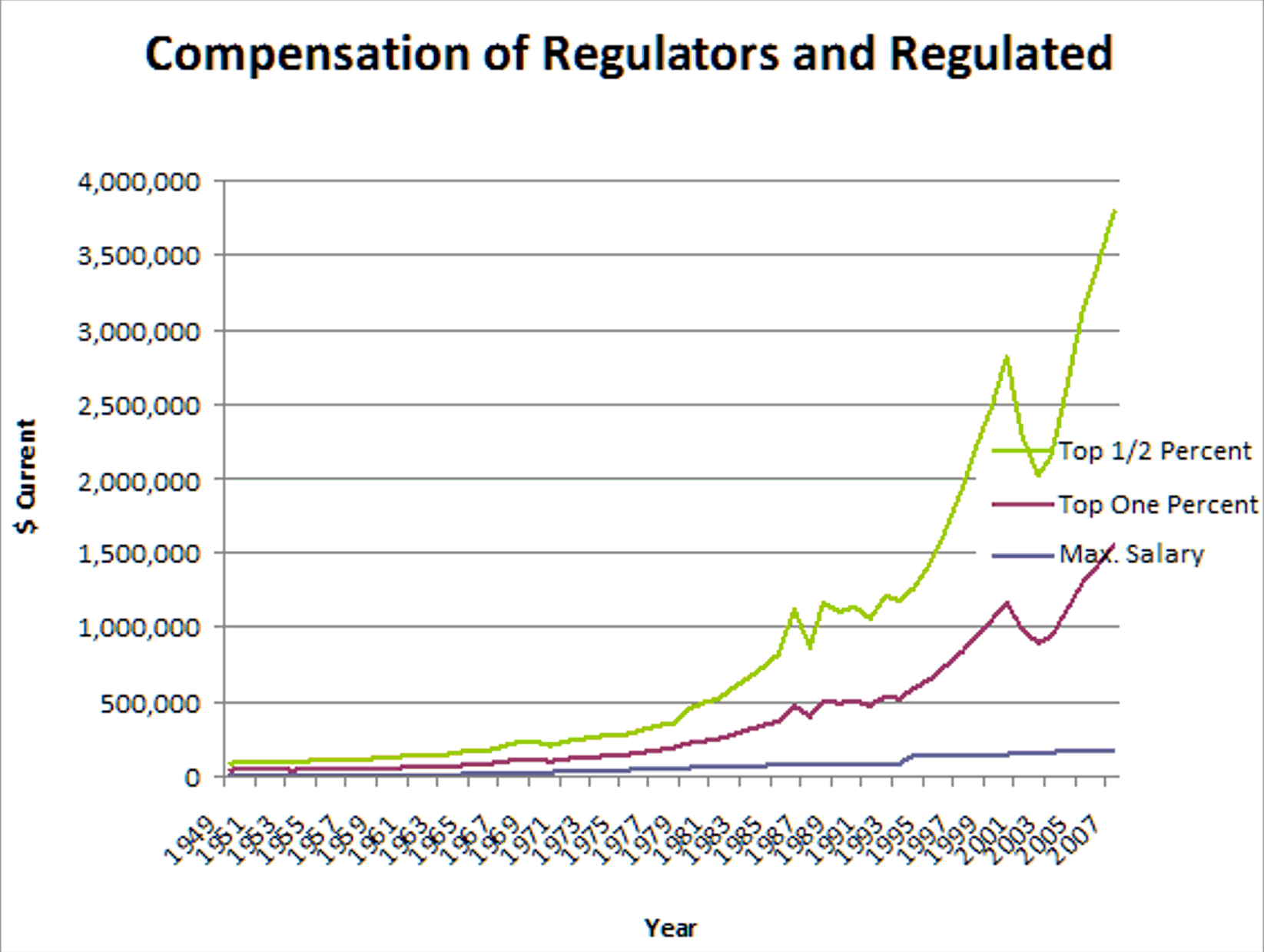
Figure After Ferguson and Johnson, 2013
And Remember: Formal Campaign Money is Only A Slice of the Spectrum of Political Money

Figure After Ferguson, Jorgensen, and Chen, 2017
Campaign finance follows the basic axiom of the investment theory of politics:
Campaigning isn’t free. Costs are much higher than classical liberal theorists believed. As a result, either everyone pays a little to fund campaigns or a few pay for nearly everything — and control the system.
Public funding would represent a substantial improvement; and we think the few places in the US that have tried it have gained from it. Only it institutionalizes the possibility for people to run and be heard without depending on big money.


I don’t think Americans are as polarized as the pundits claim. Americans are all over the map politically speaking. Strong partisans are very tribal though, as are activists and most importantly the big donors. Morris Fiorina has written a lot about this issue and I recommend his books Disconnect: the Breakdown of Representation in American Politics and the more recent Unstable Majorities: Polarization, Party Sorting, and Political Stalemate.
One of the things that Fiorina mentions in Disconnect is that the manpower-heavy mass civic organizations of the mid-20th century were gradually replaced by “checkbook” organizations that were heavy in money but didn’t utilize a lot of manpower. People would send money to the checkbook organizations while never attending any meetings or even seeing other members in person. Money has replaced mass mobilization of people in American politics.
To me, an interesting polarization in the American electorate is described by those who don’t vote for the establishment parties, and those who do. About 40/60?
More like 45/55.
Does tribalism play a role in the transition from money to votes? McConnell is not popular as demonstrated by his complete reliance on big money. So either rural Kentuckians want Republican control enough to keep voting him in….
Or the Democratic party puts up meager candidates as part of the same oligarchy that supports neocon Pelosi in the allegedly progressive bastion of NoCal. In which case tribalism is the circus to distract the masses.
Yet in either case the public buy-in is necessary, so big money is more of a source and inspiration than a competing paradigm.
Expectation of winning are important too. When Democrats lose, they avoid their mistakes and missteps and prefer to blame dumb or racist people for not understanding how awesome they were. Between putting up lousy candidates who aren’t going to warrant the time and effort involved in voting especially for non-voters, the expectation an election isn’t in doubt will cause problems. Why bother voting against McConnell if the hackers are going to steal the election anyway?
How many people stayed home in the 2016 primary because they didn’t think Sanders could beat HRC or even voted for HRC because they saw the process as a distraction from the inevitable conclusion? Warren supposedly didn’t endorse Sanders because the HRC nomination was inevitable.
I am somewhat surprised the politicians are so risk adverse and short term in their thinking.
If Warren had backed Sanders and the inevitable HRC won, Warren could have returned to the HRC fold, while maintaining some good feelings with many Sanders’ supporters for having backed Sanders.
Just as John Kerry, who told Barbara Boxer he had to vote for the Iraq War because he wanted to run for president.
If Kerry had voted against the Iraq war, and the war went well, he could have recovered from his “mistake”.
But he might have won the Presidency if he had truly opposed the war, and avoided his “i was for it, I was against it” subsequent explanation.
It is as if political leaders, like corporate leaders, are only focused on the short term.
I am not so sure about that.
there is a cold place in hell for women who don’t support Hillary.
I suspect there are many, many very intelligent, energetic, genuinely good women who would, from time to time, prefer a cold place.
maybe, but they won’t be returning to HRC fold…
Cold place in hell: Good company, pleasant weather.
Or Warren could have even pushed Hillary supporters in Massachusetts who also love Warren to vote for Sanders or not vote, putting Sanders in a rising position with HRC having the lock on red states that were going to vote for Trump or Jeb! (clap) anyway,
The districts themselves (the states) might be the problem. Short of a completely useless Democrat (Coker) was a Republican going to win state wide in Massachusetts. The answer is no, and a sense of a natural order to politics and complacency sets in, corrupting the Kerrys of the world (there are times when he seemed like he could be the President, not in 2004 after he won Iowa) and the promotion of Warrens who are nice but won’t risk upsetting the safe race. Even HRC with her vast qualifications (snark) managed to select a very safe blue seat to run for in 2000 versus turning her name ID into a real win and credibility. Obama’s election record, as short as it was, is more impressive. Challenging Jack Ryan in a seat that could go either way was a bigger deal than bullying one’s way into a nomination contest featuring six or seven equals.
It boils down to how is a state wide Democrat in Massachusetts going to lose to a Republican? New Jersey might have become a blue state in 1992, but Bob Menendez should have been out six years ago.
big money drives tribalism which drives US elections.
That is why we discuss non monetary issues like abortions and guns and identity politics.
This is all marketed to the American people thru paid advertising or so call ‘journalism’ that is also bought and paid for.
Here is what I tell small business people. Go look at your income statement and see what your biggest tax expenditure is. For most businesses, it is the payroll tax. Nobody talks about reducing the payroll tax, not even the people who have to pay it.
Why is that? Because the people who get paid to talk about these things are getting paid NOT to talk about these things.
It is kayfab. My rural conservative relatives in Tennessee want Medicare for all, aren’t racist but understand downward pressure on wages with too much illegal immigration. They wanted businesses punished for hiring illegals to cut demand, not rounding people up and separating families. When you explain half of the state of Tennessee ‘s budget is federal dollars, they calm down about taxes. Hated the bank bailout. Don’t care much about gay marriage. Opiods are a scourge. Appreciate people getting ahead by hard work. See decline all around them and think system is rigged. They live in an overwhelming white area. They do feel under siege culturally. Almost nothing they see on tv is anything they can relate too. Remakes of old tv shows really irritated them. Especially the new magnum pi. Would be ok if the show was just called something else. Democrats are the status quo economically and the status quo is decline. Republicans at least talk about going back to an economically better time. Both parties are corrupt. They all respect Bernie Sanders and think he is honest, even if they don’t agree with him. When pressed about what it is they don’t agree about, they can’t really come up with much.
Very interesting observations and summary. I wonder where these folks might intersect with those who do not hold American conservative views but share their concerns? Is there still time for compromise, and how do you get people together in body to discuss these issues? The internet is invaluable but I can’t help feeling that people need to start meeting people again in places where such matters can be discussed in a civil manner. Come to think of it, I suppose the NC meet-ups provide such opportunities!
The lessons of 2006 and 2008 versus the Clintonistas efforts wasn’t to waste time convincing people but to squeeze and grow the base through seeking like minded voters. Of course, you don’t get the volunteers and the receptive voter with garbage candidates.
The central conceit of the 50 state strategy was people are more sympathetic to the positions of the generic Democratic Party than any other option. Encouraging people to watch Maddow more closely to unlock the codes doesn’t grow the base or squeeze the base because in safe districts people won’t vote because they don’t see how it can add up state wide. Rural voters are down the list because of bang for your buck realities. The obvious step was to move to rural areas while leaving an infrastructure in place after 2008, but Obama had he wanted so he put Timmy Kaine and Rahm in charge of important operations.
“How can I help it that Power likes to walk on crooked legs?”
–Nietzsche
“Also Sprach Zarathustra “
Public funding: I used to hear a lot about Arizona’s public funding for campaigns. In the last ten years Arizona has been very right wing. Is that why it is no longer held up as a model of campaign finance?
Expectation of winning are important too. When Democrats lose, they avoid their mistakes and missteps and prefer to blame dumb or racist people for not understanding how awesome they were. Between putting up lousy candidates who aren’t going to warrant the time and effort involved in voting especially for non-voters, the expectation an election isn’t in doubt will cause problems. Why bother voting against McConnell if the hackers are going to steal the election anyway?
How many people stayed home in the 2016 primary because they didn’t think Sanders could beat HRC or even voted for HRC because they saw the process as a distraction from the inevitable conclusion? Warren supposedly didn’t endorse Sanders because the HRC nomination was inevitable.
Its sort of the reverse of overconfidence. In 2006, I thought there was a path to victory for Jim Webb against George Allen, but until George Allen’s public slur caused his fall from grace, there seemed to be a strong element of people who simply believed there was no path to victory. From my canvassing experience in that period, I felt there was a constant barrage of Webb voters who told me winning was impossible as Allen had his own popularity but they still want to send a message. The Kaine gubernatorial election was the previous year, but Kaine was at least the Lieutenant Governor. The expectations were different.
An alternative to the public funding of campaigns, which I heartily support, would be to require that ALL campaign contributions be made anonymously, as is sometimes required in certain judicial elections. Were this measure to be implemented, it would require a governmental structure to assure anonymity and the funneling of the anonymous contributions to the proper candidates. It would also require the creation and enforcement of serious legal penalties, criminal and civil, for breaking the anonymity rule. Public funding would certainly be simpler and less subject to abuse and evasion, but anonymity, if put in place with intelligence and integrity, might get us a bit closer to the goal of removing the corruption of “pay to play” that pervades our political system.
Which is why the Supreme Court declared Colorado’s (IIRC) public campaign financing system unconstitutional with truly laughable reasoning.
I have a question which the commenters here might be able to answer. I heard in a recent interview that Saudi Arabia could pay lobbying outfits to give money on their behalf to members of Congress– a two-step bribery process, essentially. So a few days ago I brought up this claim with Sen. Kaine at a public meeting. He told me I was wrong about this. Perhaps technically he is correct, but I suspect there is a workaround. Does anyone know exactly how the transmission belt works that carries money from Saudi Arabia into the pockets of members of Congress?
link
nice summary
Technically, he is right in the sense that the government of Saudi Arabia isn’t doing the donating for pay-to-play in terms of policy.
However, this is a bait-and-switch in the sense that he’s ignoring PACs and other contributions from people that technically aren’t the offical Saudi Arabian government.
https://www.opensecrets.org/news/2018/10/saudi-foreign-agents-donations-top-1point6-mill/
https://www.thenation.com/article/loophole-allows-saudi-arabian-businesses-spend-freely-our-election/
He is also mad at the assumption a pleb (I mean this ironically btw) would have that you would accuse our Good and Virtuous members of Congress of being influentially bribed – this Officially shouldn’t happen!
Thanks, Todde and Steve for those links. I should have also looked back at the original interview. It was with Ben Freeman who is the director of the Foreign Influence Transparency Initiative with the Center for International Policy and was based on his article, “The Saudi Lobby: How the Kingdom Wins in Washington”:
https://www.ciponline.org/images/uploads/actions/The_Saudi_Lobby-in-Washington_Report.pdf
which reports that:
In order to investigate the Saudis’ pervasive campaign for influence, the Foreign Influence Transparency Initiative, a program of the Center for International Policy, analyzed records filed by firms registered under the Foreign Agents Registration Act (FARA) to represent Saudi clients in 2017. This report reviews all of the political contributions made by foreign agents at these firms, all of the political activity these firms reported doing on behalf of their Saudi clients, and, critically, the intersection of these political activities and campaign contributions.
From these 2017 FARA filings we found:
• Spending of approximately $27 million by Saudi Arabia on FARA registered firms;
• More than 2,500 political activities done on behalf of Saudi Arabia by those firms;
• More than $2 million in campaign contributions from these firms;
• Nearly $400,000 in campaign contributions from these firms to Members of Congress these firms had contacted on behalf of Saudi interests;
• Twelve instances in which that contact and contribution occurred on the exact
same day.
The report suggests that the contributions from the agents are meant as bribes. It can’t prove this but at the same time it is not obvious that bribery is not occurring. The law should be written in such a way that such ambiguities are not possible.
The lobbying mostly targeted the leadership of the two parties and Kaine’s office was visited 20 times and he received the 5th highest contribution total ($20,700) from these agents.
At the public meeting Wednesday, Sen. Kaine did say he was opposed to weapons sales to Saudi Arabia. I am going to write him a follow-up letter.
https://www.motherjones.com/politics/2012/08/foreign-dark-money-2012-election-nonprofit/
The Saudis can’t give directly, but given the importance of the Clinton Foundation to the promotion of the Clinton brand, its a bit suspicion. Kaine likes to play the dope.
If Saudi Arabia gives to a Think Tank and the employees and Think Tank give despite not-comingling funds to candidates or PACs, did the Saudi plantation really give money?
Of course, there is the revolving door.
https://www.washingtonpost.com/news/powerpost/wp/2016/04/20/saudi-government-has-vast-network-of-pr-lobby-firms-in-u-s/?noredirect=on&utm_term=.86db386efd08
Lets be honest about Timmy, he was HRC’s running mate. What else is he going to say?
Tim Kaine was a big supporter for TPP than gets selected as Hillary’s VP and suddenly is against it on the following day. Why would anyone believe anything Kaine says after that and how did Clinton think no one would see his sudden change from support to disapproval as anything but political posturing? Only Clinton could have picked someone even more conservative neoliberal than herself. Her campaign really was this abysmal.
https://www.politico.com/story/2016/07/tim-kaine-trade-tpp-226054
Tim Kaine as governor of Virginia:
-signed hideous public private partnerships. The 19th century word was corruption.
-failed to unify the Democratic caucuses in the House of Delegates and State Senate on transportation, proposing a plan to put up a bunch of signs with his name on them.
-repealed the estate tax
-abdicated to run the DNC into the ground
-ceased the process of restoring felon voting rights (not an enlightened system obviously), but deciding he wasn’t going to do it at all despite bipartisan support for the system is pretty scummy. When you make George Allen and Mark Warner look like Civil Rights activists, well…you get Timmy!
Fantastic post! Even tho it states what is glaringly obvious to most of us now — that we have the best democracy money can buy — it’s still essential to have the math proofs. Definitely a reference document for the files.
It’s already self-evident that corporations and the rich do not give money away or invest without strings, with no net return, not twice anyway. Period. How can anyone believe that those who’ve invested hundreds of millions of dollars every year, decade after decade are not getting fabulous returns? Kevin Phillips showed substantive, barely legally camouflaged quid-pro-quo correlations between campaign funding and other forms of legalized public bribery, noting that such bribery (can we please call it what it is?) has by far the highest return on investment.
Less obvious for people who rely on tribal identity and support, is that the “pervasive” “alarming” divisiveness is not all that deep really and a lot of the noise is deliberately staged by two nearly identical parties grasping for some relevant facet of differentiation, however bogus. IMO, the great generational clash is part media spectacle and part tactical divide/conquer campaign, a component of “manufacturing consent”. Polls show this — over 2/3 support for single-payer (reflected in red-tribe placards shouting “hands off my Medicare”) with similarly shared opposition to perpetual-war, “Fed” monetary games, and rigged-trade pacts. On very substantive issues, tribal color may well be only skin deep. You can feel this too when you talk to people in person without the tribal gateways. That’s got to be sobering for the MOFO MOTU Davos cabal.
This study is awakening red-pill evidence that we have experienced a slow-motion coup and our democracy matrix has gone bye-bye. What we have really is the USG as organized crime, a criminal kleptocracy profiteering from mass-murder. Many of its active members may be trapped in or unaware of their true role or culpability, so I think this reality of the US as crime syndicate cannot be overemphasized
The irony/cognitive collective dissonance is that, despite the billions spent by the R and D political machines, the public has been gulled into believing that a few relative pennies spent by ‘the Russians’ on Facebook ads somehow turned the last election.
Yes, drastic Campaign Finance Reform is really important. But it’s also nearly impossible, politically and technically.
Politically, because – as Yves (almost) says – we’ve gone too far. Big donors own the system (all three branches, now).
Technically, because the viscosity of money is too low – it flows at a high rate through the smallest cracks in any system. “Issue” ads don’t count as contributions to any particular campaign, things like that. More particularly, the modern propaganda machinery (Hate Radio, Fox, Social Media, etc) will be very hard to regulate or even track.
The fact that the winner of the last Presidential election spent significantly less money than the loser should give us some hope, but somehow, it’s not working for me…
Separately, I’ve got some GraPhascist quibbles:
1. left axis on 1st graph is labeled “percent”, but numbers go 0-1 vs 0-100
2. On Graphs 2 & 3 (vote% on Y-axis, $% on X-axis), the data points along both edge (0% or 100%) should probably be excluded, at least where the Vote% is 0 or 100% (implies uncontested race). Are there really dozens of races where one party spends ALL the money?